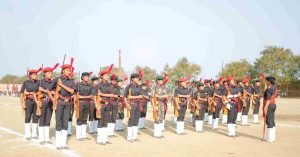Military schools have long been a source of fascination and intrigue for many people, particularly those who have never attended one themselves. While some may view these institutions as the ideal place for young people to receive a rigorous education and develop strong leadership skills, others hold a variety of misconceptions about what military schools are really like. In this blog, we’ll explore five common myths about military schools and set the record straight.
Myth #1: Military schools are only for troubled kids.
This is perhaps one of the most persistent myths about military schools. In reality, military schools are open to all students who are interested in pursuing a challenging academic curriculum and developing leadership skills. While it’s true that some parents may choose to send their children to military schools as a way to address behavioural issues or academic struggles, this is by no means the only reason why students attend these institutions.
Myth #2: Military schools are like boot camps.
Contrary to popular belief, military schools are not designed to be boot camps. While students do receive a structured and disciplined education, they are not subjected to the same kind of harsh physical training that is often associated with military boot camps. Instead, military training academies focus on helping students develop discipline, responsibility, and a sense of personal pride through a variety of educational and extracurricular activities.
Myth #3: Military schools are only for boys.
While it’s true that military schools have historically been male-dominated institutions, this is no longer the case. Today, many military schools welcome female students and provide them with the same opportunities for academic and personal growth as their male counterparts.
Myth #4: Military schools are only for students who want to join the military.
Another common misconception about military schools is that they are only for students who are interested in pursuing a career in the military. While it’s true that some students may choose to attend military schools as a way to prepare for a military career, many others attend these institutions simply because they offer a challenging academic curriculum and a supportive community of peers and mentors.
Myth #5: Military schools are overly strict and regimented.
While it’s true that military schools have a strong emphasis on discipline and structure, this does not mean that they are overly strict or regimented. In fact, many military schools offer a wide variety of extracurricular activities, including sports, music, and theatre, as well as opportunities for community service and leadership development. Additionally, military schools often provide students with a supportive community of peers and mentors who are dedicated to helping them succeed both academically and personally.
Ending Note
While there are certain misconceptions and military school myths, the reality is that these institutions offer students a unique and rewarding educational experience. By providing a challenging academic curriculum, a supportive community of peers and mentors, and opportunities for personal growth and leadership development, military schools help students to become responsible, disciplined, and successful individuals.
If you are interested in pursuing a military school education for yourself or your child, consider exploring options such as Dr Mukundrao K. Pawar Public School. With a focus on academic excellence, leadership development, and personal growth, Dr Mukundrao K. Pawar Public School provides students with a well-rounded education that prepares them for success in all areas of their lives. By dispelling the common myths and misconceptions about military schools, we hope that more families will consider the many benefits that these institutions have to offer.




